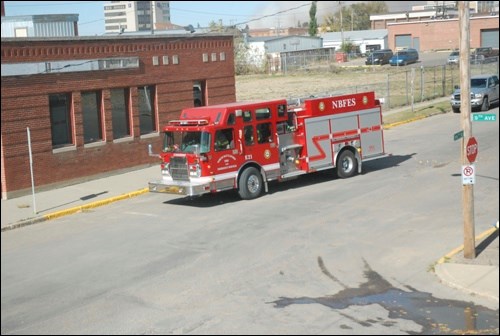Grassfire season is off to an unseasonably early start in the Battlefords.
Usually it's April when North Battleford Fire and Emergency Services is called to respond to the first reported grassfires in the area. But fire crews have had to respond to three grassfire incidents already this season.
One took place March 15 around 5:40 p.m., on the 11800 block of Ravine Drive, where the occupant of the home was burning garbage and sparks ended up igniting beside the house.
A second grassfire broke out on the west side of King Hill on March 18 around 4:19 p.m. The fire department responded with one pumper and a brush fire unit as well as three firefighters, who were on the scene for about 25 minutes.
Earlier that day Battleford Fire Department was called to a grass and brush fire along the hillside at the east end of 25th Street. Alert passersby called 911 and the blaze was quickly doused.
The latest grassfires are an unwelcome side effect of the long stretch of mild weather conditions the Battlefords and most of North America have enjoyed this winter.
With the mild and dry conditions, as well as a lack of snow on the ground during much of that time, fire crews have had to deal with grassfires during months when usually there is plenty of snow on the ground.
At a North Battleford municipal services committee meeting March 19, Fire Chief Pat MacIsaac reported that for the first time in memory the department attended a grassfire in the month of February. The fire chief pointed to the mild conditions as a main factor.
While grassfire season has started much earlier than usual, there has been some relief to the early trend this week.
Deputy Fire Chief Brian Wilson told the News-Optimist, "certainly the lack of snow cover this year is going to lead to an increased number of grassfires."
"Until things start to green up, there is that elevated risk of grassfires," said Wilson.
The vast majority of grassfires are caused by humans, Wilson notes, from controlled burns that get away, fire pits, disposal of smoking refuse of materials outside of vehicles and other activities.
Sometimes natural phenomena like lightning strikes can cause grassfires. The vast majority are accidental, as few people will intentionally start a grassfire, said Wilson.
He acknowledged a little bit of snow cover from recent weather patterns will help in terms of sheltering the grass, but it doesn't mean the risk is totally diminished, noting the grassfire in February happened with snow cover on the ground.
He says any area with exposed grass will have "all the elements" to be susceptible to a grassfire.
To prevent grassfires, Wilson urges good property maintenance, as grassfires are typically small and easier to contain if grass is cut short. Making sure to deal with the dried leaves from the fall that build up on properties also ensures properties are kept safe, and he urges compliance with the city's bylaws when it comes to setting a fire or having an approved fire pit.
He also urges people to be cognizant of the fact spring is usually a time when there is more dry grass around, and to think through their activities with that fact in mind.
"It all boils down to people thinking before they do anything, and using a little bit of common sense," said Wilson.




